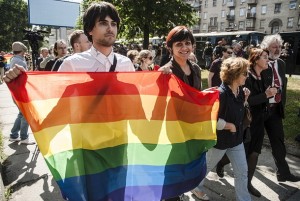
It was supposed to be the gay pride parade they had hoped for last year when the country’s first ever celebration of Pride was overshadowed by a media focused on anti-gay rhetoric. But for most members of the burgeoning LGBT Ukrainian community, Saturday’s festival was a secretive affair marred by security concerns, the politics of the moment and what many LGBT activists and leaders are describing as rampant and increasingly violent homophobia. “A real Pride Parade is something for modernized, democratic countries with a high level of education and tolerance for individuals,” said Nazariy Boiarsky, an LGBT activist involved in this year’s Kiev Pride events. “A real gay Pride Parade in Ukraine will not be possible for many years to come.”
The problems, many argue, stem from a clause in an association agreement the Ukraine signed in Brussels last month with the European Union. According to a report from Al Jazeera, “the Ukrainian parliament [decided] last month to remove a statement from the EU visa liberalization documents requiring Ukraine to adopt anti-discrimination legislation on the basis of sexual orientation. The measure would have given Ukrainian courts precedent to prosecute employers, landlords and police for discriminating against people because of their sexual orientation or gender status — a key issue for the LGBT community.”
Of course, politics is the art of the possible and Ukrainian leaders recognized that if any vote on closer ties with the European Union were to pass their parliament, the anti-discrimination laws would have to be dropped. And despite the fact that Georgia and Moldova signed the pact, the EU, for its part, recognized the Ukraine’s “unique” situation vis-à-vis Russia. “Without the EU agreement as the platform, it will now be more difficult to get the parliament to adopt anti-discrimination legislation addressing sexual orientation because it will be seen as an LGBT issue in a country rife with homophobia,” observed Olena Shevchenko, chairwoman of Insight, which conducts LGBT advocacy and education programs.
Leaders of the LGBT community in Kiev, the country’s capital, assign blame for the wave of homophobia squarely at Russia’s doorstep. During Euromaidan, a period of social unrest and protests that began Nov. 21, 2013 in an effort to oust then Ukrainian president Viktor Yanukovych, several ultra-nationalists groups with names like the Right Sector and the Freedom political party made openly anti-gay rhetoric part of their platform. With a pro-Kremlin bent, this vocal minority attempted to redefine the Ukraine as a nation defined by traditional conservative values which, as in the United States, translated into blatant homophobia. Compounding the problem are so-called ‘anti-gay propaganda’ laws in neighboring Russia which have led to an increase in violent attacks against members of the LGBT community.
Meanwhile, for participants of this year’s Pride rally, security reasons forced them to meet outside the city at a location that was made known to them only hours before the event. “It’s surprising to me that the country that was the first of the former Soviet countries to decriminalize homosexuality after the Soviet Union was destroyed is now heading in a backward direction,” said Elena Globa, head of the board for Tochka Opori, or Fulcrum, a Kiev group focused on advocacy, education and support projects for LGBT- and HIV/AIDS-related issues.











